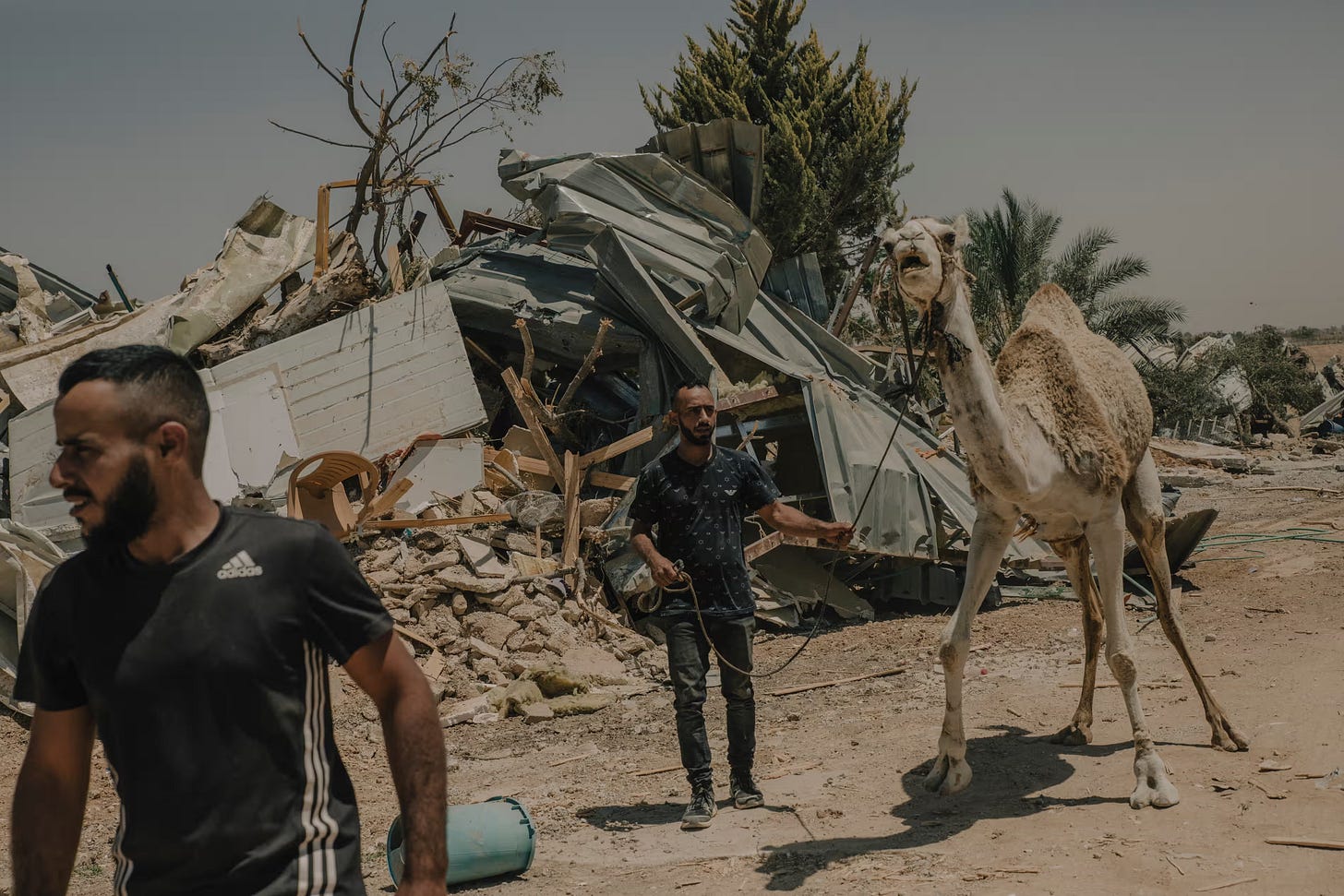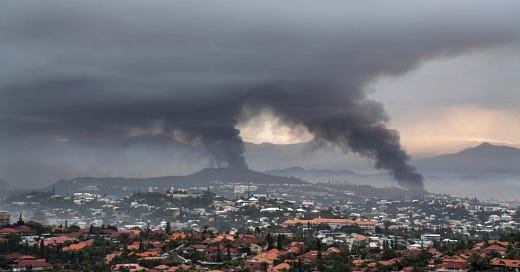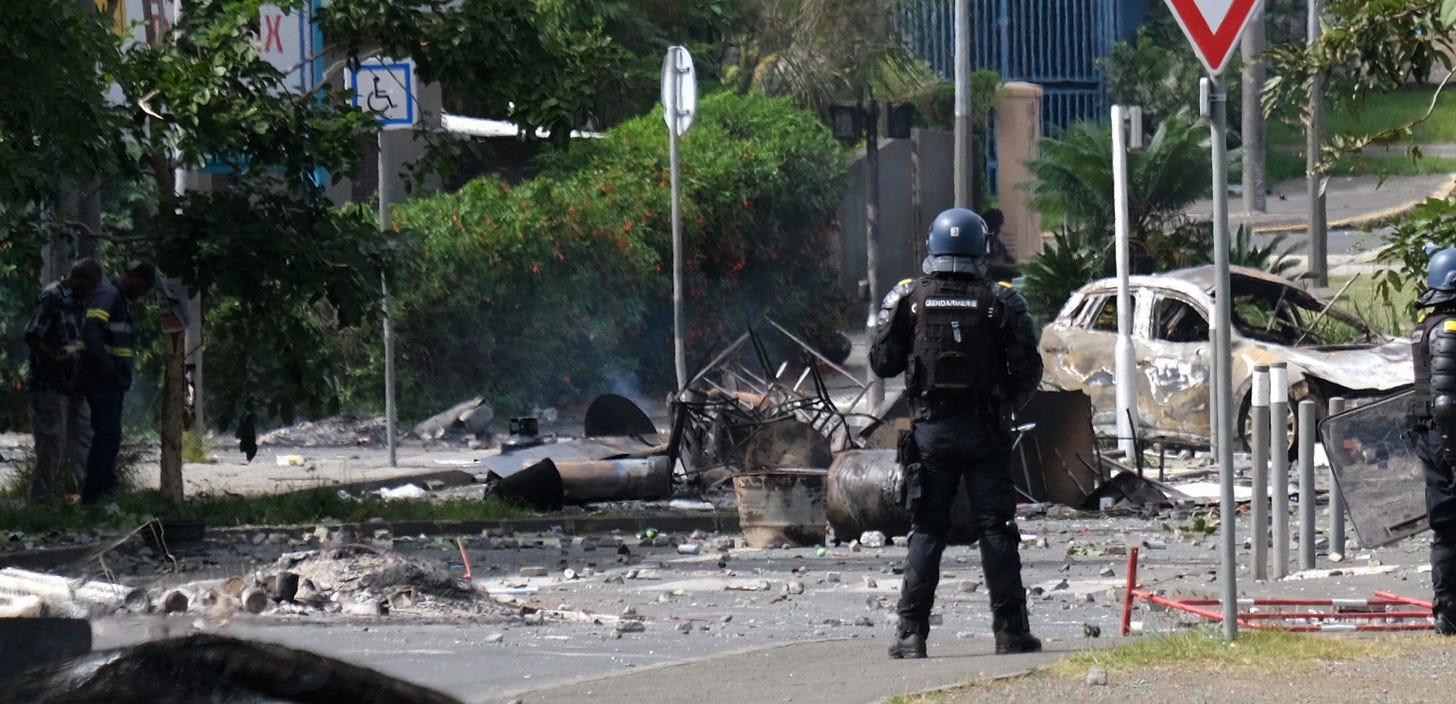In Kanaky, the Melanesian island chain called New Caledonia by settlers, the Kanak people are still fighting against colonial rule, with barricades and clashes all over the main island. The most recent upsurge of resistance began with a French government attempt to give voting rights to a large number of white French settlers, which would lead to fewer obstructions on policy issues. Kanaky is treated like a resource colony that France exploits mostly for its nickel reserves. Tesla and a Swiss consortium are both involved in nickel mining there.
In response to the riots, Macron’s government declared a state of emergency, banned public gatherings, and blocked certain social media sites, while police have shot and arrested an unknown number of Kanak resisters. Even though Paris is about 18,000 kilometers away, France has presumed to rule Kanaky since invading and carrying out a major genocide over 170 years ago.
Fortunately, in May and just yesterday (8 June), there were solidarity protests in several locations of France for self-determination and against continued occupation. Since anti-colonialism needs to be global, more translations of this news could help the spread of consciousness and effective support. Complicity in colonialism could go from profitable to costly with enough solidarity visits to any French companies (e.g. Michelin, Dannon, Air France-KLM, Dior, L’Oréal, Carrefour) and any international companies involved in extractivism in Kanaky (e.g. Tesla).
Indigenous solidarity has been the most developed and present globally. Also yesterday, a fono or meeting was held in Aotearoa with Kanak who were a part of the independence movement and who had lost family members in the repression, making links between Kanaky, so-called New Zealand, and Palestine. Read about here: “We all have the same fight” says Kanak youth at solidarity fono”.
There’s another historical connection relating to Kanaky that is still haunting revolutionary movements today. In 1871, France was using New Caledonia as a penal colony, about 20 years after conquering it. 1871 is an oft-remembered year for revolutionary movements in European and settler countries, because of the Paris commune. After holding out for two months, the communards were overrun, with over ten thousand killed, 40,000 captured, 15,000 tried, many executed, imprisoned, or sentenced to hard labor… and over a thousand deported to New Caledonia.
One of the most inspiring exiled communards was Louise Michel, an anarchist who I think did an exemplary job of balancing the needs of education, organization, healing, and fighting against the existing system. She became famous in the Commune for rabble-rousing, inspiring people to take action, running a school for the children, healing the wounded, and fighting in the trenches. Her book on the Paris Commune is one of the most valuable texts on anticapitalist struggle from the 19th century. Yet for some reason, it hasn’t been translated into English. Translators! Where are you at?
I’m going into extra detail here because I wanted to send out a birthday note for her a couple weeks ago, on May 29, but I was too sick with chemo symptoms and too overwhelmed with my work backlog… maybe ignoring my health and squeezing a little more out of myself just to meet an arbitrary writing deadline actually wouldn’t have been the most fitting tribute to her.
The timing felt relevant though, reading about a surge in Kanak rebellion right as Michel’s birthday was coming up on my calendar: Louise Michel was one of the communards exiled to Kanaky, to so-called New Caledonia. The time she was there was a time of active resistance by the Kanak to French colonial rule. Michel supported the independence fighters and documented some of the resistance. She also writes about how the greater part of the socialist exiles opposed or even helped suppress Kanak resistance, and took Kanak servants to ease their time in exile.
This isn’t only a historical drama, but a split that continues to the present day, when the majority of the Left refused to fully break with colonialism and the anticapitalist currents most favored in academia still have a colonial view of the world—that noxious idea of progress (whether historical or universal, dialectical or humanistic)—baked into their theories and their telling of history.
In the spirit of making connections of solidarity based on an awareness of how these systems operate in our own lives and globally, here’s some more news.
Last night, Israeli forces killed several hostages, 64 children, 57 women, and over 120 other Palestinians, mostly noncombatants, to rescue 4 hostages. An overwhelming majority of Israeli society celebrated the attack on the Nuseirat refugee camp, which some Israeli forces infiltrated disguising themselves as aid works, a tactic that puts real aid workers at risk.
Israeli officials acknowledged that the 4 hostages they didn’t kill were in “good health” after 8 months in captivity. The same could not be said for the roughly 10,000 Palestinians that Israel holds captive in its own prisons. Israel systematically employs torture against detainees and has given itself the legal right to hold Palestinians without charges and without trial.
Earlier in the week, the Israeli military demolished all the houses and structures of a Bedouin community of 500 in the Negev desert, outside the Gaza strip. The settler military also uprooted their olive trees, a systematic attack on the ecology and self-sufficiency of locals. Some Bedouin communities in the Negev have been forcibly evicted hundreds of times by Israel. The pro-genocide jewishpress.com celebrated the evictions, claiming they were “years overdue” and that the “illegal squatters camp” was “generously compensated”. Zionist paramilitaries expelled over 80% of the Bedouin, the Negev’s indigenous inhabitants, when they created the white supremacist ethno-state in 1948.
The Bedouin are traditionally semi-nomadic, though the Israelis have done everything possible to criminalize this lifestyle (which is the most ecologically intelligent on those lands). This is not unique: nearly all nation-states, from the US to the UK to China, criminalize nomadism, just as nearly all nation-states (like the US, the UK, and China) commit genocide in the course of their foundation or to extend their borders and their power.

The office of Itamar Ben-Gvir, the national security minister, stated that “there’s a considerable increase in demolitions of illegal houses in the Negev and the minister is proud to lead this policy and is doing it every week. Every outlaw must know the Negev’s lands are not no man’s land, and Israel will fight all out against those who take over lands and try to set reality on the ground.” The statement, aside from the racism of calling Bedouins “outlaws,” contains an encoded insult against Israel’s victims of the sort meant to appease a liberal media while containing dog whistles for the far Right: the Israeli government has been a pioneer of the explicit strategy of ignoring the law and changing facts on the ground, shifting borders by expelling people and conquering territory by force.
Meanwhile, mainstream media in the US, even those considered left-of-center, continue to create wiggle room to help Zionists justify their genocide against Palestinians (for example, the author of this piece seems to think that adding bullshit to bullshit will help it float; counter to all evidence, he claims that a) the Israeli military is being restrained and that b) if they could just be allowed to use heavier tactics they would have won already). And all throughout the university encampments, mainstream media did whatever they could to stretch the definition of antisemitism to include any criticism of the state of Israel. And while antisemitism is a structure of global capitalism and remains a problem in many parts of the Left, it’s in the drinking water of the far Right.
Israel is a recent state built almost entirely on stolen land. It is an ethno-state modeled on apartheid South Africa. Opposing Zionism is opposing racism; Zionism and Judaism are not equivalents. On the contrary, many Jews are anti-Zionist, whereas Zionist politicians regularly make alliances with antisemitic, fascist-leaning movements and the majority of Zionists are antisemitic and racist Christian evangelists.
But, “Repeat a lie often enough…” seems to be the practical philosophy of mainstream media. One lie they constantly repeat is that this is an “Israel-Hamas” war. They erase Palestinians from the headlines while Israel erases Palestinians from the face of the earth. The media ignore all the undisputed evidence of how Israel is deliberately targeting civilians, how the results of the Israeli war is to kill and traumatize and displace Palestinians en masse, and how most of the leading Israeli politicians have gone on record to announce their intentions not to stop until there is no more Palestine. And yet, with each new attack, the media obediently publish Israeli denials, claims of an “accident” or accusations that the houses or people targeted were connected to terrorism, as though this were newsworthy, as though Israeli claims had any weight at this point.
Historical amnesia is the media’s M.O. They are structurally and intentionally incapable of establishing patterns, because a pattern can lend itself to people putting together a critical analysis of the world they live in.
So, every week, the media may or may not report about the latest attack by the Israeli military or settlers against aid agencies and aid shipments. They will rarely mention how the military systematically aids and organizes settlers in these attacks. And they are highly selective in what past actions they choose to remember, even just a week later. How many people remember Israel cracking down on the UNRWA relief agency, claiming it was linked to Hamas? How many media have explored the evidence backing Israeli claims since then? (Very few, even though it could be a headline that non-Israeli analysts have described that evidence as weak or nonexistent.) What about Israel’s deliberate April 1 attack on a properly announced, marked, and registered aid convoy? How rigorously did the media fact check Israel’s claims about that “accident”? Or when they opened fire on Palestinians seeking food aid at the end of February, multiple times the same day, and then claimed all the deaths—from gunshot wounds—were the fault of a Palestinian stampede? Who even remembers which attack I am talking about, given they have done the same thing So. Many. Times.
In the foregoing paragraph, contrast news articles from the larger, mainstream sources—NBC, CNN, AP, Reuters, all of them center or left-of-center—with articles from media that are non-Western, not owned by major corporations, or less dependent on advertising, and then compare those with this HRW report. All of them leave much to be desired, but notice how the mainstream media—which have far greater reach and ability to shape public perceptions than a humanitarian NGO—almost never mention anything that happened more than a week earlier than the incident in question, and the few articles that do go into more depth quote Israel first and at greater length, while refusing to compare Israeli claims to existing evidence. And when they report the latest Israeli attacks, they bury how often all the victims are civilians, and how this is an intentional result of Israeli war aims and methods.
While I believe it’s important to continue to signal the complicity of media institutions with all the oppressions of our society—and in this case genocide—it also matters how much importance they have lost in the last couple decades. Nowadays, far more people get their news from social media, and it tends to be validation of what they already believe. People who know before any conversation starts that Arabs are bad guys and US allies are good guys are watching videos that make light of the war, that celebrate it, that make a joke of it. People who don’t like genocide watch videos of humans getting blown to pieces, and they get angry, and depressed, and don’t really do much more than that.
Back in 2003, we didn’t have social media, but we knew before the first jet launched off a carrier that the impending invasion of Iraq was based on a lie, and that it was going to be a blood bath. I think there was at least as much international action in resistance to that war—not just protest but attempts to sabotage the war effort as well—as there has been now, and the media then did not allow us to see a single video of US soldiers killing Iraqis. Photos and videos of torture, in both Iraq and Afghanistan, didn’t come out until significantly later. The current assumptions about what empathy and solidarity mean, about what motivates real action and belief and positionality, are severely distorted.
The conclusion to all this is: people have already seen the battle lines and they’ve chosen sides (to be clear, there are never only two sides, but that’s a more complex conversation, and one the dominant positions do their best to keep us from ever having). There are genocides ongoing all across the world, linked together in an unprecedented ecocide, the culmination of capitalism and the State, and we need to do everything we can to stop this. Everything besides becoming like our enemies.
The fact that the battle lines are already drawn and people’s minds are already made up is not to say we cannot change anyone’s minds, and—far more importantly—their positions in this war. But we can’t act like this started yesterday. The death machines didn’t roar into action last week, or last October. This has been going on for a long time, we’ve been fighting against it for generations, for centuries, and we need to start acting like it. So that finally, we can learn from it.







I haven't decided how to address this comment since it's mostly intended for other readers but some of it directly responds to the article. So instead of deciding, I wrote this awkward introduction.
Nomenclature: "amerikan" (the continents) & anglo (the linguistic culture) people are so generally ignorant about the South Pacific that it's not a surprise radicals have been using "new caledonia" instead of Kanaky, but it's still worth pushing back against & hopefully this article has enough reach to help with that. I wonder how many in the 1970s referred to Zimbabwe as "rhodesia"…as an aside, usually Palestinians refer to the israeli-occupied desert as the Naqab, with "negev" being the colonial preference. (I understand quite well that we can't know everything or use all the right words all the time but think it isn't bad to introduce people to more alternatives.)
Perhaps also many substack readers aren't aware of "counter-information" or anarchist practices to spread the word about events, actions, & narratives that are ignored or mangled by mainstream & even social media? anarchistfederation.net is an aggregator which includes a lot of counter info sites, so it could be used as a tool to find more specific media outlets or you can just follow everything they post, though that's probably overwhelming for a lot of people. (Counterinfo seems to be the contemporary incarnation of the underground press of the 1960s/1970s alongside older traditions of seditious, anti-status quo media.)
There is a lot to learn from the history of anarchists' rather tortured relationship with [anti]colonialism—so much of it not (yet?) available in English. There are some academic books in English, but for less daunting reading M. Gouldhawke has compiled a lot of resources that are probably worth looking through for anyone thinking through how to act without falling into predictable mistakes. https://mgouldhawke.wordpress.com/anarchism-indigenous-peoples/
https://mgouldhawke.wordpress.com/anarchists-on-national-liberation/
Thank you, that you have once again clarified some things. And continue to have strength in your fight against the damn tumor. Sofie. From the other side on the ocean.